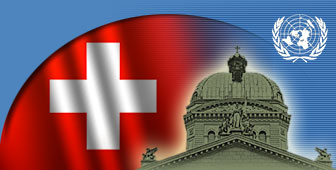
Switzerland ready to join the world?

This year the Swiss are to decide whether to end their self-imposed isolation in a vote on membership of the United Nations.
The country will also move closer to the European Union, with the implementation of a series of bilateral accords governing issues such as the free movement of people and trade ties.
But all the attention will be focused on the ballot of March 3, when voters whether the country should finally become a full member of the UN.
The campaigns for and against membership have still to get into full swing, but the outcome of the vote is expected to be very close.
The government, most political parties and the business community have thrown their weight behind UN membership, but right wing and conservative groups have warned Swiss neutrality would be compromised. Voters rejected UN membership in a nationwide ballot in 1986.
Switzerland is the only country besides the Vatican not to be a full member of the world body, but it hosts the UN’s European headquarters in Geneva.
Closer ties with the EU
In line with the government’s aims for 2002, Switzerland is expected to forge closer ties with the European Union this year without becoming a full member of the 15-nation bloc.
A first set of bilateral treaties, covering transport, trade and labour, look set to take effect before summer. Swiss voters approved the accords 19 months ago, but several EU members delayed the ratification procedure. Belgium’s parliament finally gave the accords the thumbs-up in December, paving the way for their implementation.
In the meantime, talks are underway for a second series of bilateral agreements between the Swiss government and the authorities in Brussels. The accords include agreements on security and asylum, as well as tax evasion and customs fraud.
Government aims
The Swiss government has also said it plans to continue the fight against international terrorism and strengthen internal security without sacrificing basic rights.
High on the agenda are also plans for tax cuts, reforms of the public service infrastructure and agriculture, as well as the system of higher education in Switzerland.
The government said the reforms were necessary for Switzerland to remain competitive on an international level.
Wartime past
The coming year will also offer an opportunity for Switzerland to come to grips with its wartime past. In March a commission of experts, led by the historian, Jean-François Bergier, will present its final report on Switzerland’s role during the Second World War.
The wide ranging probe was launched five years ago at the height of an international debate over dormant Holocaust era accounts in Swiss banks.
Several studies by the nine-member Independent Commission of Experts have already been published over the past few months, catching media attention worldwide and causing sometimes bitter controversy in Switzerland between historians and witnesses of the wartime years.
Expo.02: A national showcase
In mid-May, the Swiss national exhibition, Expo.02, is due to open its doors to the public. Held once every generation, the exhibition aims to portray the country in its different social, political, and cultural dimensions.
The site for the event is a region around three lakes on the border between the German- and French-speaking parts of Switzerland. The new Expo was initially scheduled for 2001, but it had to be postponed for a year because of financial and management problems.
There is still a fair bit of scepticism about the Expo, but the organisers expect more than four million visitors to flock to the sites in the towns of Neuchâtel, Biel, Yverdon and Murten between May and October this year.
Switzerland’s older generation has fond memories of the two previous editions held in Lausanne in 1964 and Zurich in 1939.
New flag carrier
Before Expo.02 gets underway, another symbol of national identity is set to rise from the ashes.
A new national airline, based around the collapsed flag carrier, Swissair, and the regional airline, Crossair, is expected to take to the skies at the end of March.
The 70-year old Swissair was forced to give up after it accumulated massive debts following the failure of its expansion plans.
The new flag carrier, which has still to be named, faces a few more obstacles before it becomes fully operational, despite massive cash injections by the federal authorities and business.
But the airline is seen as a lifeline for the Swiss economy and Switzerland’s best standard-bearer abroad.
by Urs Geiser

In compliance with the JTI standards
More: SWI swissinfo.ch certified by the Journalism Trust Initiative





























You can find an overview of ongoing debates with our journalists here . Please join us!
If you want to start a conversation about a topic raised in this article or want to report factual errors, email us at english@swissinfo.ch.